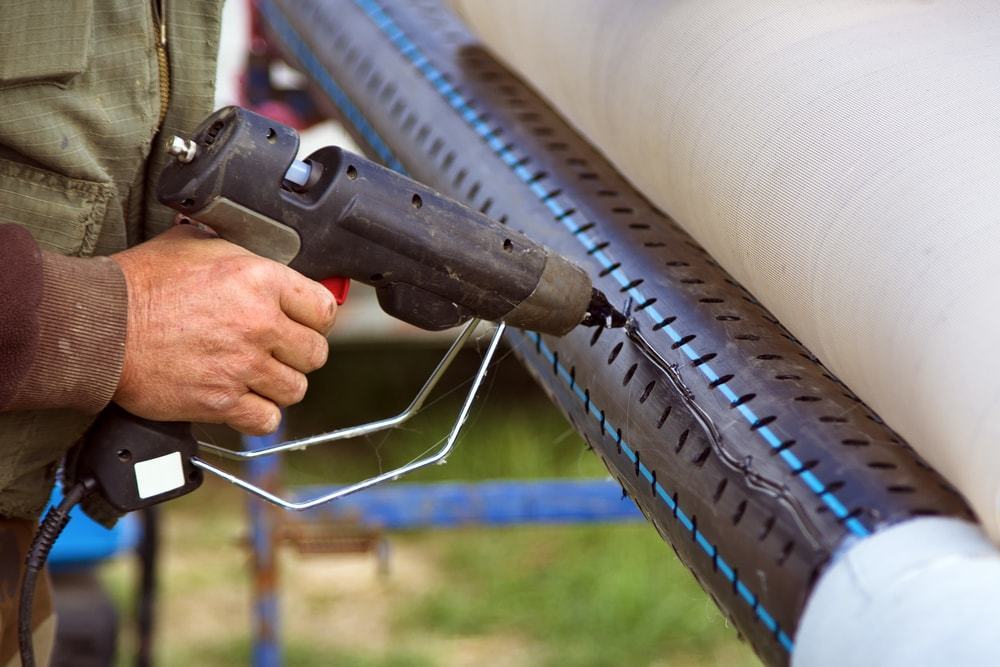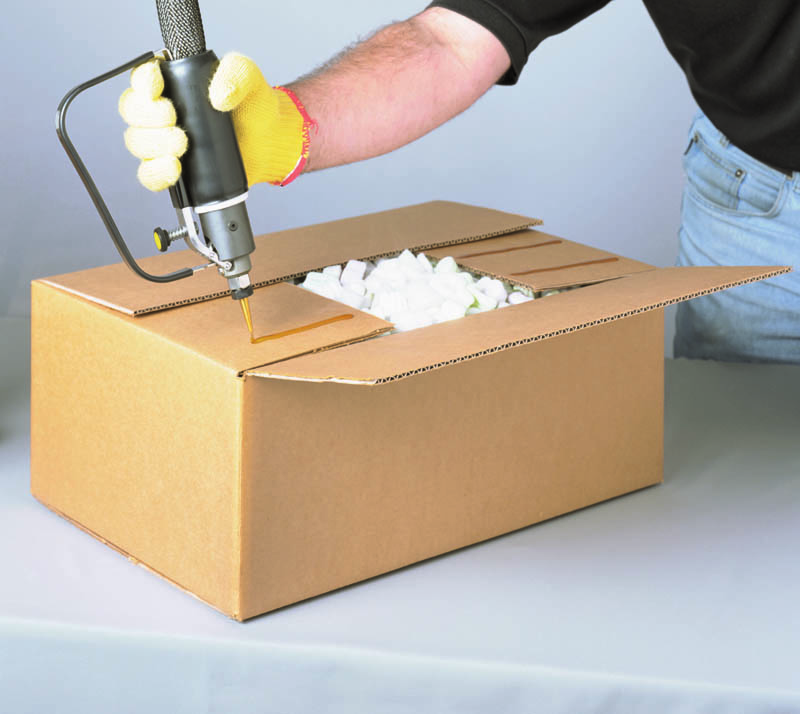Now the question is whether such hot glues are waterproof or not. Let’s dive in to know the answer to this question in detail and the important reasoning behind it. Is hot glue waterproof? The precise answer is yes, hot glue is waterproof. Hot glue is extremely water-resistant and has the capability of dealing with other solvents too. Not only just water, but hot glue can also endure varying temperatures, chemicals, or eroding.
What makes Hot Glue Waterproof?
Hot glues have an effective resistance capacity towards the water and other solvents. Such glue can even withstand saltwater of the sea, chemicals, and deviating harsh temperatures. This is because polymers construct hot glues that make glues effectively impermeable. This impenetrable nature doesn’t allow water to enter the things bound by hot glues.
Does Hot Glue Work Underwater too?
When we put hot glue underwater, the sudden decrease in temperature of the surroundings makes the glue contract more than the gluey state.
The bond weakens, resulting in holes and cracks in between the joints. But molecules of water remain in motion due to inertia. Hence after some time, the material and hot glue detach themselves. This shows that hot glues are not giving rise to underwater operations.
How does hot glue react with an increase in temperature?
Hot glues have a set specific range of temperature. If the temperature increases or decreases, then hot glue loses its water-resistant capability. In case of an increase in temperature of surroundings, hot glue expands and then comes back to its original proportion forming the adhesive bond again. This property of reshaping hot glues’ bonds is known as thermoplasticity.
What is the water-resistant capacity of hot glue on all kinds of materials?
Hot glues are water full proof. But it doesn’t mean we can put materials in water every time and expect those materials to be fine as before. The water-resistant capability of hot glue also depends upon the kind of material. Every material behaves differently with the same glue. Here is the water-resistant capability of hot glue on every kind of material:
1. Hot glue on plastics
Plastic portions, when it is melted with other materials such as glass, wood, or fabrics, react poorly with water disclosure. Hot glue is not enough to hold and keep these other materials stuck to the plastic. That’s why one should always use moderate water while performing water projects to keep a water model intact as hot water can nullify the effect of sealant.
2. Hot glue on wood
Wood exists as a porous solid, so welcomes water more than other materials. Wood must have a cover with a water sealant to protect itself from harsh surroundings.
If the wood does not provide a water sealant, it will soak up water and get bulgy over a while. This bulging puts extra pressure on the glued part, which makes glue ineffective in joining the parts of the wood.
3. Hot glue on metals
The water-resistance capacity of hot glue on metals completely depends upon the type of metal we stick with hot glue. But generally, metals are good conductors of heat. If heat is in the environment, it passes through metals raising its temperature, and hence the bond between glue and metal weakens. Even in colder temperatures, the ability of hot glue to withstand water decreases, and after some time metals detach themselves.
4. Hot glue on the glass and fabrics
Glass is an amorphous solid and undergoes expansion and contraction in increasing or decreasing surrounding temperatures. This makes the bond between hot glue and glass result in detachment. Fabrics, on the other hand, possess a very strong bond towards hot glue. The only condition is the quality of hot glue used must be of a higher grade.
Can we use hot glue as a sealant?
A sealant has to be most powerful and durable. The sealant has to adjust several times even after gluing. It has to move and even spread in some cases. But due to the non-flexible nature of hot glue, it becomes unable to work as a sealant and fulfill all requirements. That’s why hot glues don’t form good sealants. This is because hot glues can not withstand weathering and pressures up to the extent that a sealant requires. But if the glue is stuck properly then it may not detach while adjusting, but as the object works further, the bond in glue becomes ineffective.
Should we use hot glue outdoors?
Hot glue proves very effective in sticking stuff indoors. But now the question arises that hot glue works the same outdoors too. The answer is no, hot glue doesn’t work powerfully outdoors. For instance, the wooden lantern in our house sticking using hot glue works long-term. On the other hand, wooden objects in your ground sticking with hot glue work short-term and detach after a while. This is because glues can’t bear UV radiations coming from sunlight. Only a few types of glue based on polyethylene can bear ultraviolet rays. Hence, other glues must take into use than hot glues outdoors.
Where can you use hot glue guns?
Hot glue guns have limitations as glues are ineffective in using outdoors and as sealants. Below are the applications of hot glue guns:
In manufacturing processes
Hot glue guns are widely used in manufacturing processes. From hygienic disposal products to smaller products in automobiles, hot glue guns have a broad application. It has a major use in the following manufacturing processes: • Paperback bindings • Magazine bindings • Artificial textiles in vehicles • Artificial fabrics in furnishings and home • Synthetic textile in mobiles • Diapers
In electronic equipment manufacturing
Hot glues are also used in preparing electronic equipment. It has applications in making showcases to protect wiring from surroundings. Hot glues can fill up gaps that couple various parts of an electronic appliance. It makes parts stronger and also instills water-resistant capability. Hot glue is applicable in place of traditional tapes in covers, batteries, or displays of devices. This gives devices a decent look even after renovating. The melting part of glue guns is also used in syringes.
In constructions from wood or woodworking
Hot glues have a great affinity for wood. It is widely used in wooden ply doors. Such glues are also used in place of fasteners providing a temporary bond until a stronger bond comes into existence. The other major uses of hot glue in woodworking include: • Furniture manufacturing • Cabinet making • Laminate bonding • Window installation • Flooring induction • Door building
In exporting and packaging
The hot glue has application in strong packaging and sending stuff abroad. Hot glues have wide use in almost every kind of packaging.
Hot glues are applicable in car toning packaging of almost all sizes by small to large scale factories. Other applications of hot glue include: • Envelops • Bags • Label applicators • Wine or beer boxes • Crackers packaging • Frozen food packets • Cereals packaging • Paperboard packaging
Precautions one should adopt while using hot glue
Several precautions advised by experts need to be adopted while using hot glue. Such safeguards include: • Glue guns should not have exposure in higher temperatures such as in sunlight while not used. Too much heat will make the glue melt making it brittle. • Trays and heatproof counters are essential to use equipment while taking hot glue in use. This is because if trays are not used, then one has to apply more force to the glue enforcing hot melt adhesives bubble. • You must be aware of the type of hot glue gun one should use depending upon the project or construction work. For instance, if it is a simple school or college project. Such projects need to attach soft materials with glue. • Then one should use a low-temperature gun melting at about 250 degrees temperature is enough to use. For higher-level constructions such as in industries or major electronic equipment. Hot glue guns that can melt at about 400-500 degrees temperature one should use else the whole construction will deteriorate.
Interesting posts you must read Is Canvas Waterproof Does Lighter Fluid Expire pH of Lactic Acid CHF3 Lewis Structure Is Burning a Candle a Chemical Change Does Sand Absorb Water Is NaOH an Acid or Base Is Copper Malleable CH2Br2 Lewis Structure Is Soap Acidic or Basic
Conclusion
Hence this is your answer to the question in detail of whether hot glue is waterproof or not. We discussed what makes hot glue waterproof. Then we learned whether hot glue works underwater or not. We get through the effect of rising temperature on the objects sticking with hot glue. We get to know a new term used in hot glue guns, thermoplasticity. We make you aware of the water-resistant capability of hot glue over almost every kind of material including fabrics, metals, wood, plastics, and glass. You are aware of almost everything about hot glue. Now just use glue in the above-above-mentioned applications without stressing further. But make sure to follow up the precautions while using your hot glue gun.




